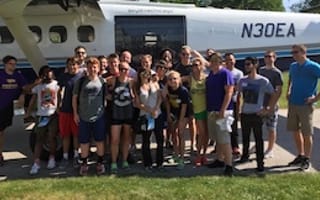
Between hiring the right team members and building out a solid customer base, running a young software company is hard enough. So when StickOutSocial founder Hans Skillrud got laid off by his investors in 2015, it would have been totally understandable if he decided to take a well-earned vacation.
His team didn’t see it that way, however.
A former divisional sales manager at Groupon, Skillrud founded SOS in 2012 after selling his Groupon stock. His vision at the time was to build applications and websites to help small businesses establish a better presence online.
About a year after founding the company, Skillrud met a pair of East Coast investors through a client. The investors wanted to use SOS to build out the underlying tech for one of their startup ideas. But after the investors got involved in a lawsuit unrelated to SOS in 2015, cash infusions were halted to the point where SOS lacked the money to meet the next month’s payroll.
Skillrud said he brought a new pair of investors in with an offer to buy the investors' share in the company, but as the negotiations dragged on, the staff's pay day was coming up.
“Basically I was put into a position where I had to make a decision about what to do next,” said Skillrud, who ultimately covered the company’s payroll out of pocket.
The next day, the investors called Skillrud — who was out of town at a trade show — to let him know that he was no longer in charge of the company.
“It was probably about a 10 minute phone call,” said Skillrud. “I was fired from the company I had built from the ground up. That was a weird feeling. And I was in Dallas, of all places. I’d never even been to Dallas.”
What Skillrud didn’t know was that the investors had offered his job to Executive VP Kelly Prieve, who had been his first employee after founding SOS.
"Lo and behold, she didn't accept the position, and there was a complete falling out of anyone willing to work for the investors," said Skillrud. "They more or less quit."
Once the remainder of the team had threatened to leave, the investors turned around and agreed to let Skillrud buy them out.
He did, and soon brought on a new pair of Chicago-based investors whose vision for the company aligned more closely with his founding vision. The new investors were also more hands-on in helping him run the company day-to-day.
Skillrud holds no grudges against his former investors. In his view, they were good people who were put in a bad position with no obvious way out.
But he does think that what happened to his company holds a valuable lesson for any early-stage entrepreneur considering funding for their startup: ask hard questions about expectations before taking the money.
Since he didn’t have any experience running a venture-backed company, Skillrud said he simply hadn’t thought about sitting down to ensure that he and the investors were on the same page. He also hadn’t considered what investors bring to a company aside from money.
“There’s a very big difference between an investor and a partner,” he said. “An investor is someone who will give you money and believe in a vision, but is ready to come at you if it’s not working perfectly. A partner is someone who will talk to you and think about ways to solve problems.”
Working with the new investors, Skillrud said his team has refined its business strategy, doubling down on the kinds of development projects that got him into the industry in the first place and turning away ones that aren't a good fit.
Currently, the company has 15 employees working out of its headquarters in the Chicago Board of Trade Building.
Image via StickOutSocial.
What's your company's story? Send us a note or tweet us @BuiltInChicago.






